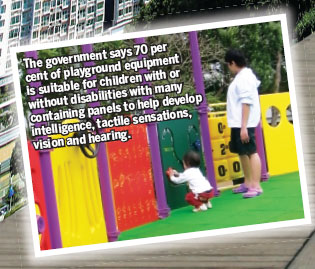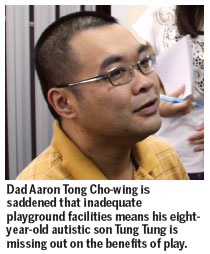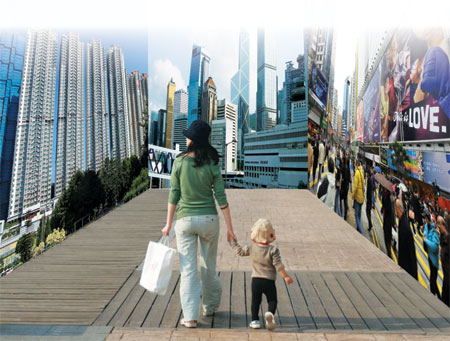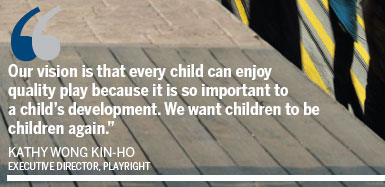No place to play
Updated: 2013-11-01 07:01
By Hazel Knowles(HK Edition)
|
|||||||
Play, declares the United Nations, is one of the basic rights of children, but in Hong Kong many children are being excluded from play because, according to research, facilities in the city are insufficient. Hazel Knowles writes.
Playtime for the kids is something Aaron Tong Cho-wing takes seriously. As the father of eight-year-old Tung Tung, he knows the benefits - especially playtime takes place in a playground.
Tung Tung is autistic and the playground gives him the opportunity to encounter other children, helping to boost his social, physical and sensory development.
Still, the playground near Tong's home does not have a roundabout and has only a couple of swings which Tung Tung has to queue to use.
"I am sad to see that the play facilities available cannot meet Tung Tung's needs at his golden age of development," said Aaron.
Aaron and Tung Tung's case was highlighted recently by the United Nations Children's Fund (UNICEF) Hong Kong and the charity Playright, both of which hold that Hong Kong could do better providing play facilities that cater to children of all abilities.
Research based on focus groups and a survey carried out for the two organizations by the University of Hong Kong's Social Science Research Centre found that many parents of disabled children shared Aaron's frustration.
Eight out of 10 of those interviewed said they considered playgrounds important, however, the majority - more than 60 per cent - had visited playgrounds with their children less than once a week in the past three months. Half said playground facilities were insufficient.
Many raised concerns that playgrounds were not meeting the needs of children at different ages, especially the needs of children with disabilities, while others criticized local playgrounds, describing them as unattractive and lacking in features which could enrich sensory and social experience for children.
Irene Chan Man-tuen, chief executive of the Hong Kong Committee for UNICEF, said 20 per cent of the parents interviewed could not find a play area. Many said they had to travel up to an hour to get to a playground.
"For disabled children that is very difficult," said Chan. "And yet it is very important disabled children have a place to play, because it is good for their physical, social and sensory development and because they can interact with other children."
Chan said it was important that all children, including those with disabilities, be able to enjoy their right to play, as stated in the United Nations Convention on the Rights of the Child, a declaration ratified by Hong Kong in 1994.
"Unfortunately, the emphasis is on learning and overeducating children. The result is that a child today has 1.7 hour less of play per day than a child born in the 1970s," said Chan.
Physical outdoor play
"That is quite a substantial drop. UNICEF believes that every child, regardless of whether they are disabled or not, should have at least one hour of play per day.
"We are not talking about computer or video games, television or any activity in a tuition environment. Some parents think a structured painting class or chess class is play, but it is not."
"It should be physical, outdoor, unstructured play which is totally initiated by the child."

According to Chan, the research indicated disabled children did not have the opportunity for this kind of quality playtime. They are excluded because playgrounds did not fully include them, or meet their needs.
"There are about 700 playgrounds run by the Leisure and Cultural Services Department (LCSD). Of these around 36 are said to be inclusive," said Chan. "But we don't consider them inclusive at all. The definition applied by the government seems to be that an inclusive playground is one that has a barrier-free entrance to permit wheelchair access. That is not really inclusive.
"To be inclusive, a playground has to include equipment that can be used by disabled and other children together - such as basketball hoops that may be adjusted to different heights, swings that can take more than one child at a time, and slides of different widths so parents can slide down with their children."
UNICEF has been working with Playright since 2012 on a project to promote more inclusive playgrounds in Hong Kong. Playright's executive director Kathy Wong Kin-ho says the right to play has become very much a forgotten right.
"Our vision is that every child can enjoy quality play because it is so important to a child's development. We want children to be children again.
"This concept is not really widely recognized. But people focus on other things which they think are more important than play, while forgetting that play is important. This is not just in Hong Kong. It is a global scenario."
Later this year, the two groups will publish a set of guidelines aimed at defining an inclusive playground for those involved in creating playgrounds - both public and private.
The next step will be to create a model inclusive playground, said Chan, adding that the groups were in talks with the Home Affairs Department, seeking authorization to go to an existing playground to create the trial project.
The Home Affairs Department told China Daily it was considering the request. A spokesperson for the LCSD, however, denied any lack of play facilities for the disabled. The spokesperson insisted the department is committed to providing inclusive equipment and that the reported data did not reflect the existing facilities.
In a statement, the Home Affairs Department said there were 800 sets of children's play equipment distributed among the city's 700 playgrounds. Of these, the statement said, 70 per cent were inclusive.

"This play equipment has been installed to enable children with or without disabilities to have fun, learn to interact with other people and grow up as part of a harmonious community," it said.
"Elements of intelligence are blended into the design to suit the needs of children with different physical conditions. For example, there are play panels to help develop their intelligence, tactile sensitivity, vision and hearing.
"Some play sets also help boost their physical fitness by building muscle strength in the upper and lower limbs as well as enhancing balancing ability.
"With these uniquely designed, interesting and practical sets of children's play equipment, children with or without disabilities can play and learn in a joyful and safe environment. Through making friends with one another, they will learn to accept and respect other people, while their communication skills will also be enhanced," it said.
Not inclusive
Playright's Kathy Wong agrees with Irene Chan that LCSD playgrounds are accessible but not truly inclusive.
"A real inclusive playground is one which addresses the needs of all people. That includes those in wheelchairs, those with autism, the hearing and sight impaired, all disabilities.
"To create an inclusive playground you have to consider so many different things, such as different abilities, different ages, also the caretakers.
"For the child, the play experience needs to include physical, sensory and co-operative play. We also need to consider the whole layout and create a play space which is welcoming to all children. It should also include support facilities such as seating areas and family toilets."
All of these aspects would be included in the draft guidelines, she said.
Later this month (November 17), Playright will also host a "Cheers for Play" event at the Chater Road pedestrian precinct to show parents how to include one hour of play in their children's daily routine.
UNICEF's Irene Chan said she hoped that with the cooperation of the government they would have the inclusive playground ready sometime next year - the 20th anniversary of Hong Kong's ratifying the Convention on the Rights of the Child.
"We see it as a little baby step which will foster awareness of inclusive playgrounds for all children, so we will become a more inclusive society."
Tung Tung's father Aaron Tong is also hoping the project will be successful.
"I hope we can reclaim a happy childhood for every child by providing an inclusive playground as soon as possible, so that the next generation can have a chance to interact with each other at an early age, and get to know the true meaning of inclusion."



(HK Edition 11/01/2013 page3)